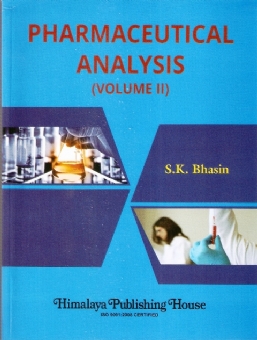Pharmaceutical Analysis Vol. – II
no information available
It gives me immense pleasure to place berore the large community of Pharmacy teachers and students, my humble work entitled "Pharmaceutical Analysis - Volume II" written strictly in accordance with the recent syllabus of B.Pharmacy course, as recommended by the All India Council of Technical Education (AICTE) and adopted by most of the universities in the country. The books which have been recommended in the syllabus of different Indian universities are mostly by foreign authors. These books are above the reach of most of the students and teachers. The books written by Indian Authors are primarily to meet the requirements of Chemistry students only and their scope is not in accordance with the syllabus of Pharmacy students. These books do not stress on the pharmaceutical applications of the different techniques of analysis. So, there is a dire need to bring out a book in accordance with the requirement of the pharmacy students as well as examinations pattern of Indian Universities. The prsent text book has been written keeping in view the requirements of the students and the teachers so as to cover all the topics with the desired limits of the prescribed syllabus. On the basis of vast experience of the author (more than five decade), the text has been prepared in a simple, lucid and comprehensive style. The book consists of seventeen chapters dealing with basic fundamentals of pharmaceutical analysis including principles, instrumentation and applications of different techniques of pharmaceutical analysys. The book may prove useful not only to the students and teachers of B. Pharmacy Course and Medical students but also to analysts, pharmaceutical quality control chemists and research in drug industry. Contents - 1. Complexometric Titrations 2. Miscellaneous Methods of Analysis 3. Polarimetry 4. Refractometry 5. Chromatography 6. Column Chromatography 7. Thin Layer Chromatography (TLC) 8. Paper Chromatography 9. High Pressure Liquid Chromatography (HPLC) 10. Gas Liquid Chromatography 11. Separation Techniques 12. Poltentiometry 13. Conductometry 14. Polarography 15. Amperiometry 16. Coulometry 17. Thermal Analysis ... Read more Read less











